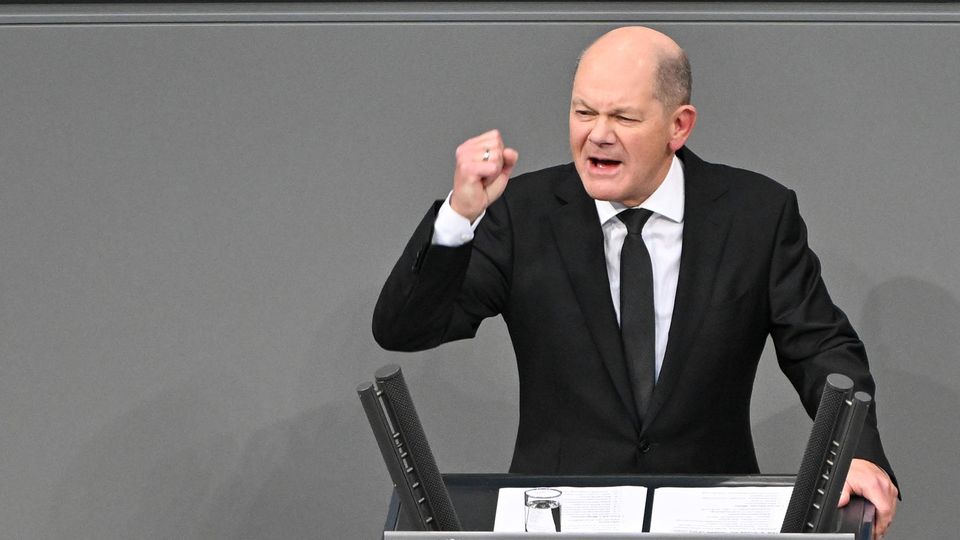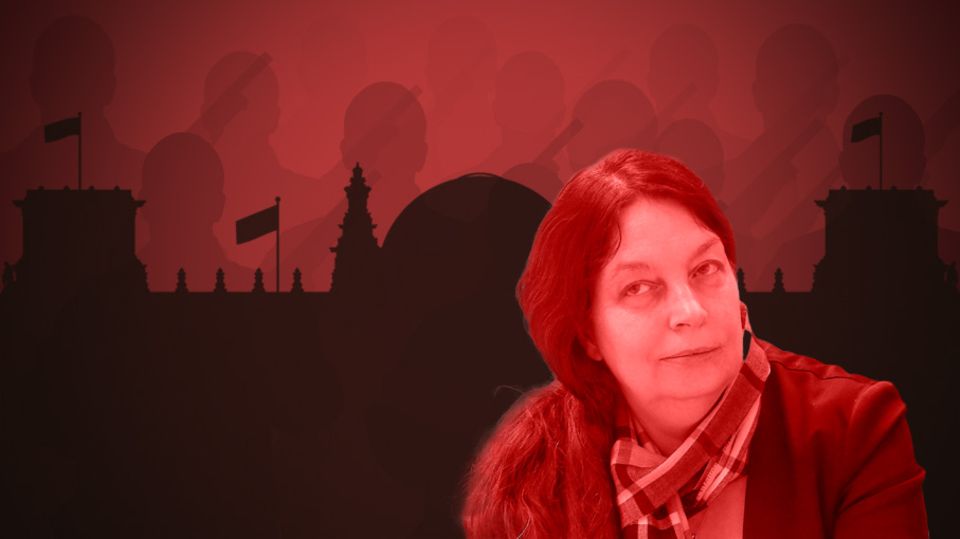Holocaust memorial hour
“Be human!” Marcel Reif’s speech in the Bundestag brings tears
Watch the video: “Be human! Be human!” – moving appeals at Holocaust commemorations in the Bundestag.
STORY: The Bundestag remembered the victims of National Socialism at a memorial hour on Wednesday. Holocaust survivor Eva Szepesi spoke there. The 91-year-old was taken to the Auschwitz-Birkenau extermination camp in 1944 at the age of 12 on one of the last transports. Szepesi was born in Hungary and comes from a Jewish family; her mother, father and brother were murdered. Original sound Eva Szepesi, Holocaust survivor: “It is a great honor for me to be able to speak here today. I am very happy that you, my dear daughters, grandchildren and great-grandchildren, are present here. You give me so much strength and love. You exist because 79 years ago, on January 27, 1945, I was liberated by the Red Army as a 12-year-old in Auschwitz Birkenau.” ://: “Every day I think about my murdered family, and I often ask myself, why did I survive? It has become my life’s mission to speak for all those who can no longer speak.” ://: “I know that I passed on the trauma of the Shoah to my children, grandchildren and great-grandchildren. But the fact that they now have to experience these existential fears in real life hurts me greatly. The Shoah did not begin with Auschwitz. It began with words . It began with society’s silence and turning a blind eye.” ://: “October 7th, the day that changed everything for us Jews in the world. Since then, my everyday life here in Germany has been characterized by increased security measures, increased anti-Semitic incidents, fears, conversations that end with ‘Yes ‘but’ begin, or the loud silence from the middle of society.” ://: “It frightens me that right-wing extremist parties are being re-elected. They must not become so strong that our democracy is endangered. We are close to that. I hope that society does not remain silent when anti-Semitic statements are made at the next table. Those who remain silent are complicit.” Marcel Reif, sports journalist and son of a Holocaust survivor, also spoke at the ceremony. Original sound Marcel Reif, son of a Holocaust survivor: “But at some point I almost suddenly realized that my father had spoken after all and had told me and given me everything that was important to him, what he had saved. Distilled as an essence from all the inhumanity of the captors and murderers, from the superhumanity of such a brave Berthold Beitz, from what he himself had achieved with the little boy who had questioned his own humanity. He packed all of this into one small sentence. And I “I remember more and more every day how often he gave me this sentence. Sometimes as a reminder, sometimes as a warning, as advice or even as a reprimand.” ://: “Then I’ll leave you with the small and yet so great, wonderful sentence that my father Leon Reif said. Then I’ll leave you with this sentence here: ‘Be a human being, be a human being.'”
The Bundestag commemorates the liberation of the Nazi death camp Auschwitz 79 years ago and the millions of victims of the Holocaust. With powerful words, Holocaust survivors Eva Szepesi and Marcel Reif build a bridge to current events.
It was just a small sentence that Marcel Reif heard again and again from his father – sometimes as a reminder, sometimes as a warning, as advice or reprimand, as the sports journalist said in the Bundestag on Wednesday. Just three little words: “Be a human being – be a human being.” He would like to leave this “small, great, wonderful sentence” from his father Leon Reif here today, in the highest German house: “Be. One. Human.” Reif himself paused briefly. Some in the chamber wiped tears from their eyes.
It was the commemoration of the 79th anniversary of the liberation of the Nazi extermination camp Auschwitz on January 27, 1945, the commemoration of the million victims of National Socialism – 79 years, “almost a human life,” as Bundestag President Bärbel Bas said at the beginning. However, all of the speakers touched on today – to the new fears of many Jews in Germany, to the strength of right-wing parties, to the mass demonstrations for democracy and against right-wing extremism of the past few days. Responsibility does not expire, said Bas. ““Never again” was, is and remains a task for our entire society.”
Marcel Reif horrified by what is happening in Germany – and with a spark of hope
This “never again” was also invoked by Marcel Reif, who, as the son of a Holocaust survivor, spoke for the second generation of victims – especially about the fact that his father remained silent about the horror in order to protect him, his son. “‘Never again’ is by no means an appeal,” said Reif. “”Never again” can only be, must only be – “never again” must be – a lived, immovable reality.” He was horrified by much of what happened in Germany after Hamas’ terrorist attack on Israel on October 7th. “But what was seen there recently, the big demonstrations by the upright, gives me hope.”
91-year-old Eva Szepesi, a generation older than Reif and herself a survivor of the Holocaust, described it in a very similar way: “‘Never again’ is now!” she also shouted to her listeners, including the Federal President and President of the Federal Council, members of parliament and ministers , but also many young people.
At the age of eleven, Szepesi fled from Nazi-occupied Hungary to Slovakia and from there was deported to Auschwitz in November 1944. “I was hit by an icy cold,” Szepesi recalled of the moment when the train carriage door opened on the ramp of the extermination camp. She had to strip naked in a building. “I had on the blue jacket that my mom had knitted for me and I didn’t have the heart to take it off,” Szepesi said. In the end she did. When her braids were cut off, she stared at her hair in horror. “It was as if my last protection had been taken away.”
When the Soviet Army came close to the German camp a few weeks later, Szepesi was too weak to march away as ordered by the guards – she remained lying among the corpses of deceased women. A Soviet soldier found her there and cooled her lips with melted snow. “It was January 27, 1945 and I was alive,” Szepesi said.
It was simply fate that she and her husband moved from Hungary to the country of the perpetrators, to Frankfurt am Main, in the 1950s. “I can’t hate, I received too much love for that as a child,” said the old woman. She thinks about her family every day and the question of why she, of all people, survived. “It has become my life’s mission to speak for everyone who can no longer speak.”
Holocaust survivor warns of dangers to democracy
But everything has changed for Jews worldwide since October 7th – since “the deadliest attack on Jews since the Shoah.” Some of their performances in schools were canceled for security reasons, some took place under police protection. “I know that I have passed on the trauma of the Shoah to my children, grandchildren and great-grandchildren. But the fact that they now have to experience these existential fears in real life hurts me very.”
She was shocked that right-wing extremist parties were being elected again. “They must not become so strong that our democracy is endangered,” she warned. “We are close to that.” She still feels protected by democracy. But she is concerned about the willingness to resort to violence, hatred of Jews and hatred of people on the streets. “It’s great that so many people have taken to the streets in the last few weeks to demonstrate against right-wing extremists.” Now she also wants loud opposition when anti-Semitic or misanthropic statements are made among her friends. She tells the people she speaks to: “You are not to blame for what happened. But you are responsible for what is happening now.” It has never been more important for her to bear witness. “Because never again is now.”



